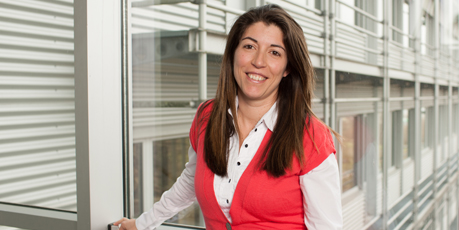Navigation auf uzh.ch
Navigation auf uzh.ch
Prof. Dr. Florencia Canelli
Her research consists of studying the structure of matter, energy, space and time at the highest energies possible to understand the fundamental nature of our universe. Her current research is the CMS experiment at the Large Hadron Collider at CERN.

Webseite Prof. Dr. Florencia Canelli
Why did you decide to become an academic?
Florencia Canelli (FC): Science fascinated me when I was a child. Questions about the physical nature of the universe triggered my curiosity more than anything else. I did not know what a career in physics was about but my interest in how the universe worked was strong enough to carry me through my studies.
What do you like best about your work?
FC: Getting a scientific result that had not done before, from the conception of the idea to the publishing, is the highlight of my work. Furthermore I like interacting with scientists. Contrary to what people might think, working in science is very social.
Did you experience any dry spells or obstacles in your career?
How did you overcome them?
FC: Sometimes the results you expected are not what nature prefers, or sometimes your work is not first in being published. This could be upsetting but I would not think of them as obstacles. I try to use these cases as motivation to sharpen my experimental tools and thinking.
Who has given you the most support during your career? And what about in your personal life?
FC: Over my career I had the benefit of getting the support from many people. My PhD and postdoctoral advisors guided me through the steps of an academic career that was unknown to me.
Did you have role models who have influenced your career? Who?
FC: Not one person. There are many people and qualities of people that influenced me.
How do you maintain your work-life balance?
FC: Work-life balance was never easy to achieve for me. There were times in my career where work was life and life without work did not exist. It has become easier with kids to have a life outside work.
What advice do you give to young researchers considering an academic career?
FC: An academic career is extremely rewarding. You get to call work what you like doing the most. It s also very demanding. It is not a 9-5 job, and it could require personal sacrifices. There is a lot of traveling and relocating. It gives you the opportunity to be introduced to different ideas and people and to also educate and train younger generations.
Contact:
University of Zurich
Institute for Physics
Winterthurerstrasse 190
CH-8057 Zurich
Phone: + 41 44 635 57 84
E-Mail canelli (at) physik.uzh.ch